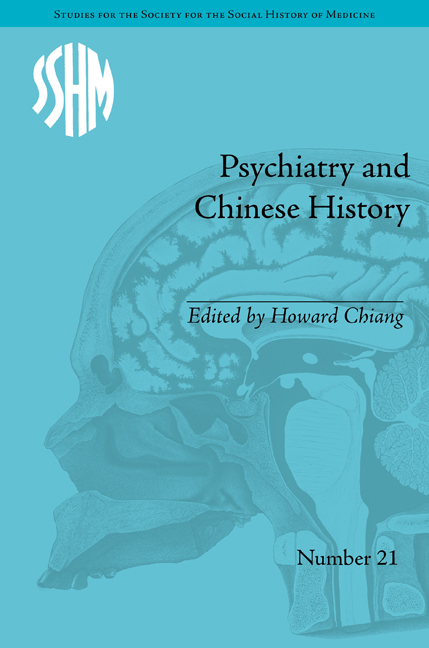Book contents
- Frontmatter
- CONTENTS
- Dedication
- List of Contributors
- List of Figures
- Introduction: Historicizing Chinese Psychiatry
- Part I Historical Precedents
- Part II Missionary Investments
- 4 Psychiatric Space and Design Antecedents: The John G. Kerr Refuge for the Insane
- 5 An Iron Cage of Civilization? Missionary Psychiatry, the Chinese Family and a Colonial Dialect of Enlightenment
- 6 Tropical Neurasthenia or Oriental Nerves? White Breakdowns in China
- Part III Biomedical Modernity
- Part IV New Therapeutic Cultures
- Afterword: Reframing Psychiatry in China
- Notes
- Index
5 - An Iron Cage of Civilization? Missionary Psychiatry, the Chinese Family and a Colonial Dialect of Enlightenment
from Part II - Missionary Investments
- Frontmatter
- CONTENTS
- Dedication
- List of Contributors
- List of Figures
- Introduction: Historicizing Chinese Psychiatry
- Part I Historical Precedents
- Part II Missionary Investments
- 4 Psychiatric Space and Design Antecedents: The John G. Kerr Refuge for the Insane
- 5 An Iron Cage of Civilization? Missionary Psychiatry, the Chinese Family and a Colonial Dialect of Enlightenment
- 6 Tropical Neurasthenia or Oriental Nerves? White Breakdowns in China
- Part III Biomedical Modernity
- Part IV New Therapeutic Cultures
- Afterword: Reframing Psychiatry in China
- Notes
- Index
Summary
In November 2011, the New York Times published two articles on the inadequacies of mental health treatment in China. In the first article, the authors discussed the ‘dearth of care’ in the dark Chinese household:
Left to their own devices, some relatives resort to heartbreaking solutions. In 2007, He Jiyue, a government psychiatrist, discovered a 46-year-old man locked behind a metal door in a stinking room in a rural Hebei Province home. The man was mentally ill, his aged parents told Dr. He. They had locked him up after he attacked his uncle.
That was 28 years earlier. The man, a high school graduate, could no longer speak. ‘I said to the parents: ‘How could you do this to somebody?’’ Dr. He recalled. They replied, ‘We had no choice’.
In the past three years, Chinese mental health workers have rescued 339 other people whose relatives were too poor, ignorant or ashamed to seek treatment. Some, shackled in outdoor sheds, were ‘treated just like animals’, said Dr. Liu Jin, of the Peking University Mental Health Institute.
In a nutshell, the article portrayed mentally ill Chinese as treated like animals, locked up by his ignorant and heartless families, awaiting a liberating and humanitarian rescue by the psychiatric science. The authors of the article used this image to lament the shortage of professional mental health care in China, to establish psychiatry's authority against other practices of care, and to legitimize the profession's expansion.
- Type
- Chapter
- Information
- Psychiatry and Chinese History , pp. 91 - 110Publisher: Pickering & ChattoFirst published in: 2014



